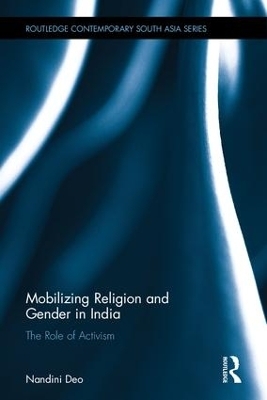
Mobilizing Religion and Gender in India
The Role of Activism
Seiten
2015
Routledge (Verlag)
978-1-138-85112-2 (ISBN)
Routledge (Verlag)
978-1-138-85112-2 (ISBN)
Religious nationalists and women’s activists have transformed India over the past century. They debated the idea of India under colonial rule, shaped the constitutional structure of Indian democracy, and questioned the legitimacy of the postcolonial consensus, as they politicized one dimension of identity.
Using a historical comparative approach, the book argues that external events, activist agency in strategizing, and the political economy of transnational networks explain the relative success and failure of Hindu nationalism and the Indian women’s movement rather than the ideological claims each movement makes. By focusing on how particular activist strategies lead to increased levels of public support, it shows how it is these strategies rather than the ideologies of Hindutva and feminism that mobilize people. Both of these social movements have had decades of great power and influence, and decades of relative irrelevance, and both challenge postcolonial India’s secular settlement – its division of public and private. The book goes on to highlight new insights into the inner dynamics of each movement by showing how the same strategies - grassroots education, electoral mobilization, media management, donor cultivation - lead to similarly positive results.
Bringing together the study of Hindu nationalism and the Indian women’s movement, the book will be of interest to students and scholars of South Asian Religion, Gender Studies, and South Asian Politics.
Using a historical comparative approach, the book argues that external events, activist agency in strategizing, and the political economy of transnational networks explain the relative success and failure of Hindu nationalism and the Indian women’s movement rather than the ideological claims each movement makes. By focusing on how particular activist strategies lead to increased levels of public support, it shows how it is these strategies rather than the ideologies of Hindutva and feminism that mobilize people. Both of these social movements have had decades of great power and influence, and decades of relative irrelevance, and both challenge postcolonial India’s secular settlement – its division of public and private. The book goes on to highlight new insights into the inner dynamics of each movement by showing how the same strategies - grassroots education, electoral mobilization, media management, donor cultivation - lead to similarly positive results.
Bringing together the study of Hindu nationalism and the Indian women’s movement, the book will be of interest to students and scholars of South Asian Religion, Gender Studies, and South Asian Politics.
Nandini Deo is Assistant Professor of Political Science at Lehigh University, USA. Her previous publication was a co-authored book with Duncan McDuie Ra, The Politics of Collective Advocacy (2011).
1. Variation in Social Movement Outcomes 2. Mobilizing Beyond the Secular 3. Founding, Goals, and Nationalism 4. Marginalization and Mainstreaming 5.Sowing Seeds of Discontent 6. Crisis and Opportunity 7. Rebuilding 8. Transnational Links 9. Activists and the Secular
| Reihe/Serie | Routledge Contemporary South Asia Series |
|---|---|
| Verlagsort | London |
| Sprache | englisch |
| Maße | 156 x 234 mm |
| Gewicht | 385 g |
| Themenwelt | Geisteswissenschaften ► Religion / Theologie |
| Sozialwissenschaften ► Politik / Verwaltung ► Politische Systeme | |
| Sozialwissenschaften ► Politik / Verwaltung ► Politische Theorie | |
| Sozialwissenschaften ► Soziologie ► Gender Studies | |
| Sozialwissenschaften ► Soziologie ► Spezielle Soziologien | |
| ISBN-10 | 1-138-85112-4 / 1138851124 |
| ISBN-13 | 978-1-138-85112-2 / 9781138851122 |
| Zustand | Neuware |
| Haben Sie eine Frage zum Produkt? |
Mehr entdecken
aus dem Bereich
aus dem Bereich
über Alltagsorte des sozialen Zusammenhalts
Buch | Softcover (2024)
transcript (Verlag)
CHF 33,55


